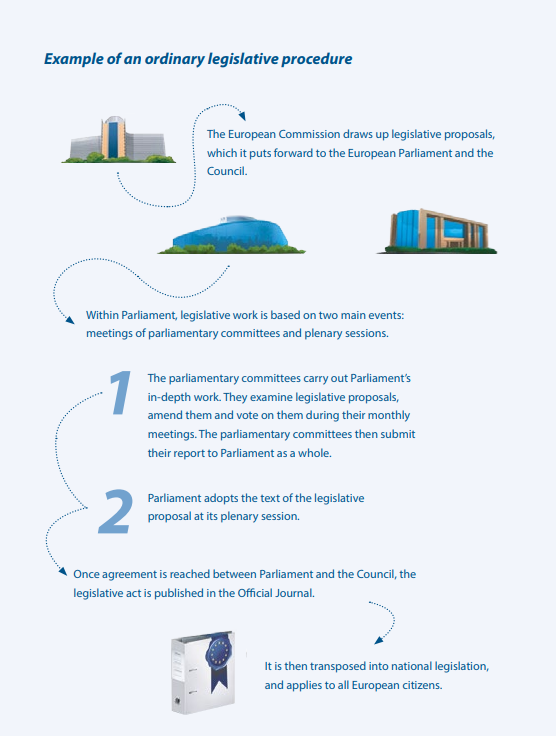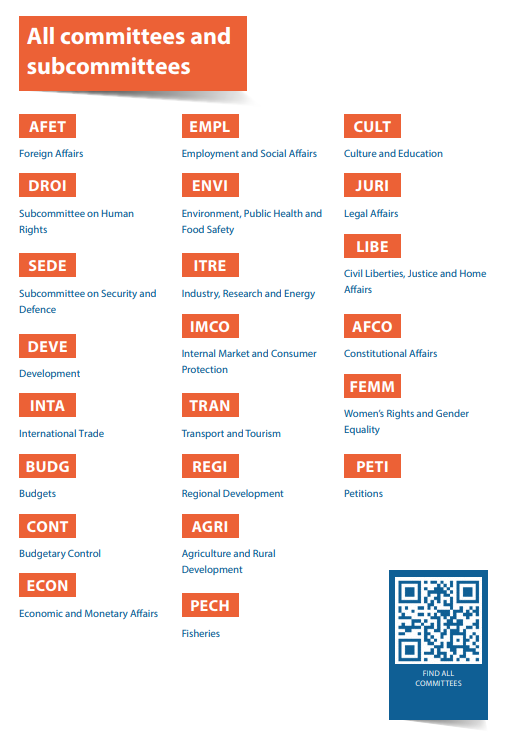TLDR: Decision making in EU is generally done with the following steps:
1) The European Commission conceptualizes legislation and make a proposal to parliament and council.
2) The EU parliament does two things:
-----2.a) It puts its committees to examine, amend, and vote (committee meetings votes), and the committees build a report and put's it on for voting in the whole EU parliament.
-----2.b) The whole EU parliament votes on the proposal.
3) This can go back and forth between parliament, commission, and council but once everyone agrees (it might take a while), the proposal (potentially amended) is transposed to all EU citizens (which in turn requires a new turn of EU national parliaments vs. government discussion on how to implement the new legislation at a national level).
NOTE: Before stating the relevant facts regarding your question I would recommend watching (and reading) the video articles about The work of MEPs and Backstage of a plenary to have an idea of the typical functions for an MEP. These take two minutes and can make the whole picture much clearer.
1. Legislative Procedure (ordinary)
You can see the legislative procedure in the following figure which you'll find in the document A Quick Look at Parliamentary Committees:

2. Right of Initiative
You will notice that the very first step is done by the EU Commission, meaning that this institution is the only one (at this point at least) with true legislative initiative. In practice things are a bit different. The EU parliament has something called the Right of Initiative which means that it always needs to ask the Commission to put forward a proposal (instead of skipping this step and propose one on its own volition):
E. Right of initiative
The Maastricht Treaty gave Parliament the right of legislative
initiative, but it was limited to asking the Commission to put forward
a proposal. This right was maintained in the Lisbon Treaty (Article
225 TFEU), and it is spelled out in more detail in an
interinstitutional agreement between Parliament and the Commission.
Typically a national parliament has legislative initiative but I assume this might prove problematic for more euro-skeptic members. As so, as it stands the EU parliament has only indirect initiative at the moment. And it's not clear if there are true limits for this method:
Whilst this 'indirect' initiative right does not create an obligation
on the Commission to propose the legislation requested, the Treaty of
Lisbon codified the Commission's obligation to provide reasons for any
refusal to follow a parliamentary initiative. Many argue in this
context that Parliament could take the Commission to the Court of
Justice of the EU if it fails to justify a negative decision.
3. Role of parliament committees
Moving on it's important to notice that the EU parliament is composed of several committees, each composed of different MEPs. So, it's quite normal to have parliament sessions that occur at the same time (but for different committees).

These work committees (each a mini-parliament) make amends and prepare reports for the whole parliament. Their functions can be summarized in:
These committees instruct legislative proposals through the adoption
of reports, propose amendments to Plenary and appoint a negotiation
team to conduct negotiations with the Council on EU legislation. They
also adopt own-initiative reports, organise hearings with experts and
scrutinise the other EU bodies and institutions.
For more about committees see article Who calls the shots in the committees of the new European Parliament? (Piedrafita, 2014).
4. Impact Assessment
You should know that the Commission itself has it's own mechanisms for studying a potential proposal (see also the article for Impact Assessment):
Before the Commission proposes new initiatives it assesses the
potential economic, social and environmental consequences that they
may have. It does this by preparing 'Impact assessments' which set out
the advantages and disadvantages of possible policy options.
So to conclude:
- The Commission make as proposal by it's own volition, or by following a request from parliament.
- The adequate parliament committee (or intergroup, sub-committee, or temporary committe) will analyze the proposal and report it to the whole parliament.
- The whole parliament will vote on the proposal. If it fails it goes back to the commission. If it passes (together with the Council approval) this is made into EU law.
Final notes: There are special circumstances for particular themes such as budget. For more on this see question Is it customary for European Union to debate multiannual budget before agreeing on the grand strategy for the next 10 years?.
EDIT: There are several official sources to analyze and review the proceedings from each of the EU institutions. Regarding decision-making here are some:
If you wish to see the current legal texts I recommend EUR-Lex, the European Union law portal. Furthermore each of these institutions has mechanisms dealing with external communication, notably:
Moreover there are presences in well know social media. I won't describe all (I don't know them all) but here are a few:
I further recommend looking on their Featured Channels (right side on their creator page) since there's a bunch of other channels dealing with particular subjects in the union (EU Tax and Customs, EU Science and Innovation, EU Security and Defence, European Central Bank, etc.).
Finally If you are looking at independent media you might want to consider the several agencies specialized in European themes:

